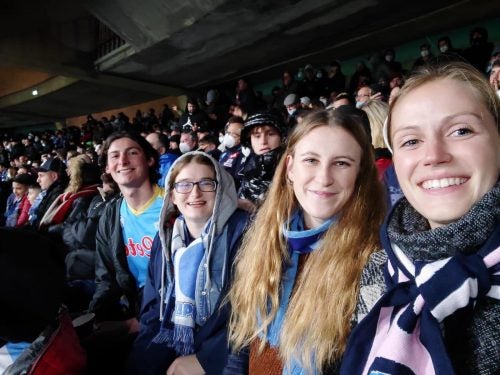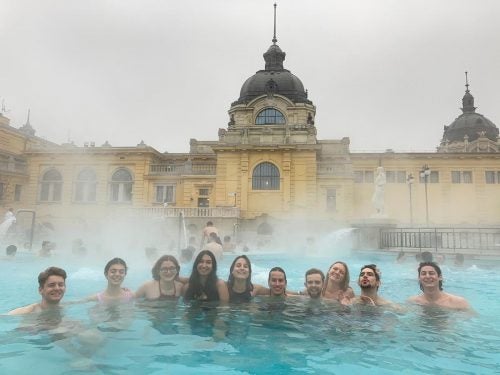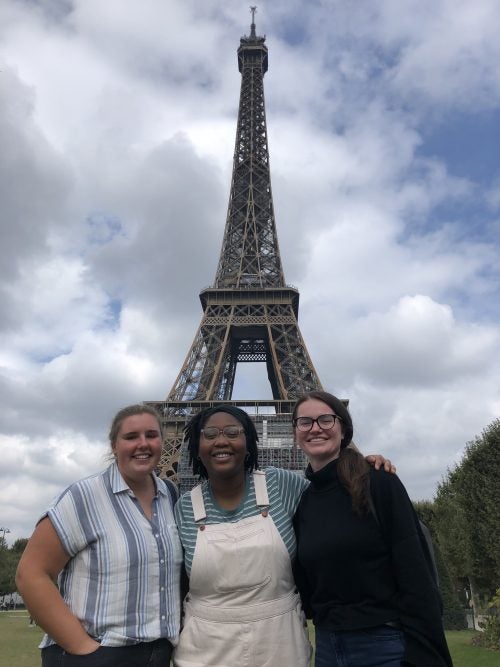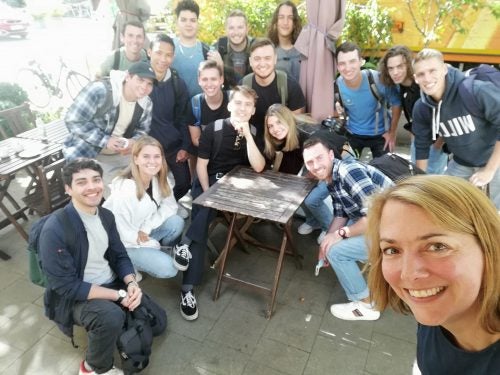IEP students as well as recent alumni chime in about their experiences abroad, why studying abroad is so important, and what they have learned.
“Postcard” greetings

JoJo Speredelozzi
‘23, Italian IEP & Biomedical EGR/Biology, currently in Italy
“Buongiorno a tutti! My name is JoJo, and I am currently studying in Naples, Italy.
Life in Napoli has been great so far. I’ve made a lot of friends through the Erasmus organization, which puts on events for all international students currently in Napoli, including trips to nearby historical sites and social events like international karaoke. Once we got to know each other, we started meeting up for all sorts of things, like an American Thanksgiving and a Napoli soccer game in the stadium this past week.
In my classes, I’ve also been making friends and learning lots. On Thanksgiving (before the dinner), I got to do a lab with my biochem class where we measured protein concentrations using a spectrophotometer. It can be a little difficult to keep up with all the technical vocabulary, but my classmates and professors are happy to help me if I’m feeling lost.
I’m looking forward to Christmas – they have been putting up lights all over the city throughout November. Also, a few friends from home will be visiting me in December, along with my family for Christmas, so I’m excited to show them around now that I’ve gotten to know Italy a bit.”

Student excerpts from our recent IEP “Voices from Abroad” event
During International Education Week (November 15-19), the IEP hosted an event called “Voices from Abroad”, at which our students currently studying abroad and those who also studied abroad in recent years were invited to speak to our students planning to go in the coming year.”
Why is going abroad worth it?
Anastasia Paraliticci
‘22 German & Mechanical EGR, currently in Germany
“It’s so critical to have international experience…. The best way to learn about other cultures is to immerse yourself in them. Now that I have been here for a couple of months, I am so grateful that I get to spend an entire year here. You get the international experience and the work experience, [and it] just makes you so much more of an interesting person in addition to looking good on paper. It will just make you stand out from the crowd!”
Kyle Keefe
‘22 Japanese IEP & Electrical EGR
“There are plenty of companies in the US that might have a branch in another country… [as well as] companies [based in] other countries that are very interested in you as someone with international competence, so studying abroad does set you apart as a resume item. [Having] a language major as being part of the IEP in and of itself makes you a very valuable candidate for multinational companies. The company [Physik Instrumente] where I’m interning at [in California] is German and Dr. Berka has [previously] sent IEP graduates [to them], so one of the things to think about is that your participation in a reputable study abroad program will make you an attractive candidate even without [having] the abroad experience. Having the IEP name behind me really helped me land this position since a lot of these multinational companies will recognize programs like this one. My study of the Japanese language made this company think that I could help them communicate with a new Japanese subsidiary that they acquired…. I’ve been exchanging emails, joining meetings, first just talking to them and now we are working on joint projects that would not have been possible without someone in my particular position.”
Kelly Domogala
‘20 Spanish IEP & Industrial EGR
“I went abroad in 18-19 and I think it’s definitely worth it – I still am very happy I had that experience. It helps you find a job, a lot of the things when I was interviewing, people would gravitate towards that on my resume and ask me about it. I did Spanish, and at my current job (at Shaw Development in Florida) about 90% of the manufacturing workers speak Spanish as their native language, so the ability to talk to them and hear what they have to say when a lot of times they are nervous to speak to engineers because they might not be able to speak English, is something that has been really worthwhile to be able to do, even years after I went abroad…”

McKensie Sherlock
‘21 Chinese IEP (Flagship) & Electrical EGR
“There is no better way to improve your language – you are surrounded by it constantly, the vending machine, the 7/11, the transportation system. Having it always in the background just helps so much. It’s such a rare opportunity, you’re not just visiting another country, you will actually experience living there… Once you do it once, then you start considering it again as an option. At first when people asked why I was [learning Chinese] and if I had wanted to work abroad,… I said it would be nice to know the language to work here in the US since a lot of people speak Chinese, but now that I have actually done it and have the experience, I could do it again, and I want to. [From] four of my friends, [at least] two went back [to Taiwan] to teach English, and [another] went to get his masters. …[Overall] you gain a lot of life skills. You gain cultural competence, some of it is culture-specific (like giving business cards with two hands) but also general things, not just sympathy but actual empathy for people here in the US as well who are living abroad [by being here]…”
What have you learned and what have been your experiences so far?
Caitlyn Murray
‘23, French IEP & Civil EGR, currently in France
“When I first got to France, I had to figure out how to get from the airport to the university. Not knowing the train system in France, it took me two trains and a bus system to get me where I needed to be. But once you’ve done that, you can practically get anywhere!
It’s really important to know when to ask for help and to accept that you are not going to know everything in the language you are studying. It can be really frustrating and I personally felt very lost (and stupid) at times, but I have had many French friends and international friends tell me “It’s not you being dumb, you’re just learning, and everyone here is learning at their own rate. There’s plenty of international students at my university from all around Europe and they have the same struggles with French that I do… Also, while it’s exciting to go on trips because everything is so close, don’t forget your homework because these classes are important!”

Jelani Pool
‘23, French IEP & Ocean EGR, currently in France
“If you have dietary restrictions, it’s really important to know what kinds of foods are pretty popular in the country you are going to and if there are stores that have more fresh produce. I have a lot of different dietary restrictions, so it was a big trial and error situation. Eventually I got it [but] it was definitely really difficult for me for the first couple of weeks.
What have I learned? Definitely to ask for help and to become friends with people who are native here [in France]. It’s really hard at first because you definitely don’t know the language…. People were really kind and gentle about it. [Also] don’t be afraid of the bus system. Learn the bus system, because it is really convenient most times. [And I’ve found that] there are also a whole bunch of reductions for college students, …so always be looking for that!
I personally have gotten involved with a church here, so everyone there has been really kind and helpful to me. So it’s like a family away from home, which is really hard when I don’t see my family as much.”
Alexis Charpentier
‘21, Spanish IEP & Electrical EGR
“I was most nervous about speaking the language and being alone in a different country, but I signed up for an immersion program and I made some friends there. That helped a lot in getting comfortable with speaking the language, and I was speaking with native speakers who were really friendly and helped me out… When I moved into my apartment, my roommate was Spanish and he was really good at helping me get my feet on the ground. I had some issues with my bank and I wanted to get a bike and everything, and he really helped me out with that. So it’s good to have people that you know can help you, and it’s pretty easy to find them – I had my roommate and all of the international students from the school. It’s like a nice little community we had!
What did I learn? A lot of independence and confidence can go a long way. Even just traveling, going with a couple of friends, getting used to the bus system and trains. It opens up more opportunities for you. Getting more comfortable and confident with speaking the language helps you a lot too… Talking with the other international students, we were able to go on trips together. We joined a gym together, and there was a soccer team, they would go to a field once a week to play. Just making friends helps a lot.”
Johnathan Marshall
‘23, German IEP & Mechanical EGR, currently in Germany

“[When] I flew into Berlin, the Deutsche Bahn conductors were striking, so we were trying to figure out what’s going on, and we were freaking out. [Know] who your peer advisors and contacts are – we ended up getting a text from someone we didn’t know saying take this train at 2:30 from this platform and then switch over [here] to Braunschweig. That person ended up being my go-to for everything from getting help with classes to finding laundry in my building and just anything! Definitely find out who those people are who can help you….
Also try to learn some basic phrases that you think you might need. For example, in the supermarkets, it was a big problem the first couple of days when I was holding up the line. I wished I had learned just a couple more vocab words so I could have made it through there more easily, but it ended up working out for the best.
What I’ve learned so far? It is necessary to [immerse yourself in the language]. For example, if you are on a train, and [suddenly] …everyone is getting off and you have to ask someone what is happening and they only speak German, it is pretty important that you can communicate when it is absolutely necessary. I’ve learned to keep an open mind. …A lot of the stereotypes I thought were true are absolutely not. One of my favorite things to do with people is just compare and contrast what we thought about each other’s countries – it’s a great way to make friends. The last thing I’d say is that the way to get involved is that at TU Braunschweig at least, there was a big orientation week, and that had events like sports games to paintball to bar crawls, and we made tons of friends doing that [just] going out and [being] willing to meet people. You can also sign up for buddies, similar to an Erasmus program, and one of the classes we are taking also has buddies, who are kinda forced to hang out with you, but they’re all really friendly and we’ve been trying to meet them outside of our scheduled time and that’s just a great way to get involved in whatever you’re doing.”
Perspectives from some of our international exchange students
Adrian Beck
TU Darmstadt exchange student studying mechanical engineering at URI
“We students [in Germany] don’t have a car and we use public transport…. [In planning] a trip to the beach for example,… here everyone says, no we’re going to take the car. You have to adapt – every country has its own perks and ways of doing things. You get the hang of it!

Going abroad / Applying for your visa, the whole Covid situation gives you so much experience in how the government operates and how international relations works… you learn so much from [these processes]. It can sometimes be rough, but it’s something you learn that you can’t learn any other way.”
Léonie Boulier
URI French exchange student studying political science and sociology at Sciences-Po in Rennes
“It was really helpful to know a bit of slang before [going abroad], so if you can watch TV series from where you are going, it’s really helpful because you will understand a lot of the cultural traits.
It is important to understand cultural differences, and sometimes it can be challenging. They are interesting to see, but sometimes it’s hard because you don’t fully understand people and some things can be hurtful even though it’s not meant like that for others. So keep that in mind, and give yourself a break. There’s something wrong here but it’s not your fault. It can be something like how people handle relationships differently. Once you realize that, you can try to adapt to their way of handling relationships. You need to understand that there are differences and communicate about it.
To get involved,… you can do a lot of volunteer work, usually there’s a lot of clubs and groups that do this. You can meet a lot of people this way [working on this] common goal.”
